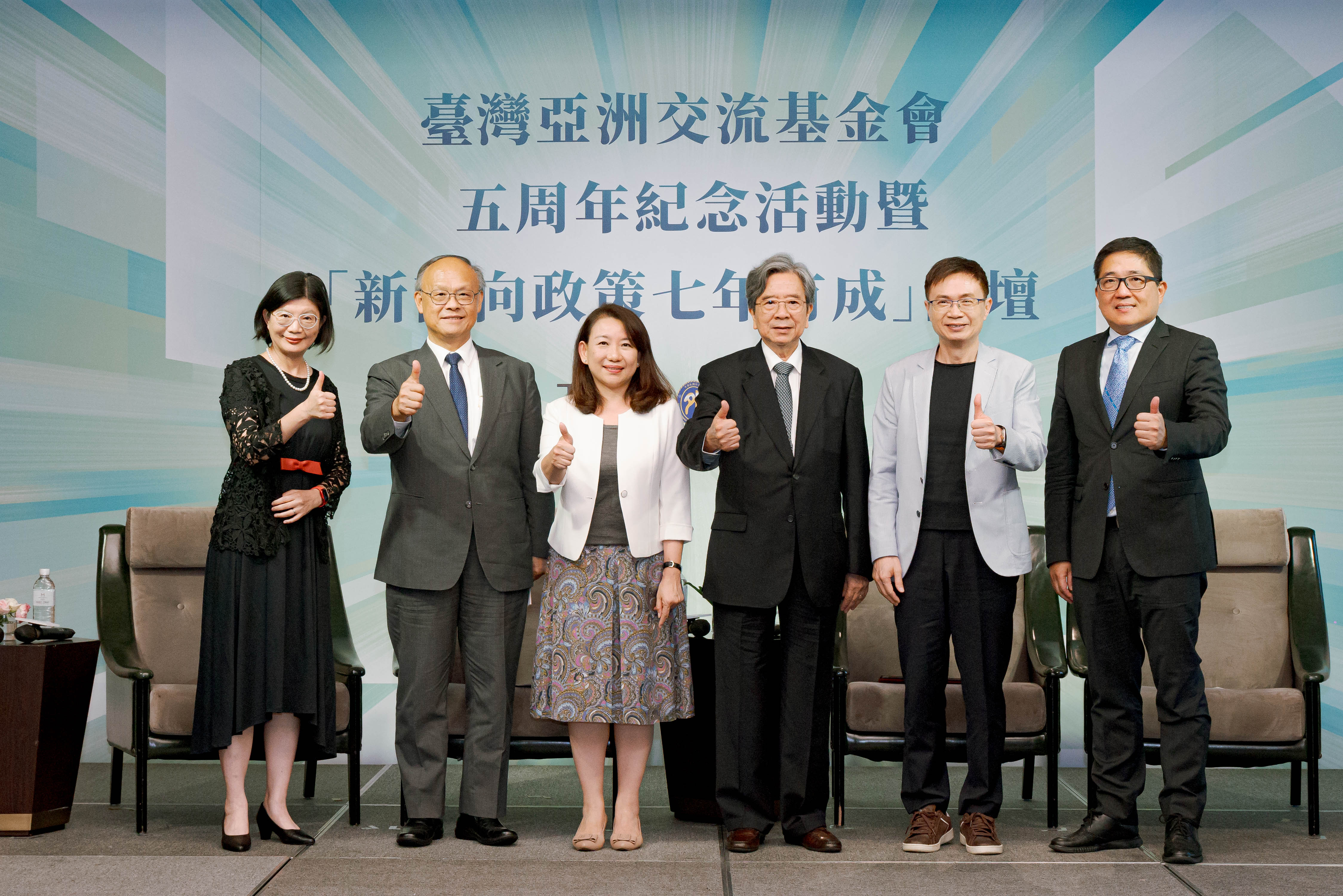
The Taiwan-Asia Exchange Foundation (TAEF) held its fifth-anniversary commemorative event and "Seven Years of Success of the New Southbound Policy" forum on August 9, 112 (Wednesday) at the Grand Mayfull Hotel, to mark the fifth anniversary of the establishment of TAEF and showcase the achievements of the New Southbound Policy.
Since its establishment, TAEF has focused on fostering warm and substantive exchanges between Taiwan and New Southbound countries. This fifth-anniversary commemorative event and forum on the "Seven Years of Success of the New Southbound Policy" invited important representatives from industry, government, and academia related to the New Southbound Policy. They discussed the policy's achievements from various perspectives. Subsequently, a comprehensive discussion was held with members of the Asia Engagement Consortium to explore the future prospects of the New Southbound Policy. This discussion set the stage for this year's Yushan Forum, themed "Start a New Blueprint for Asian Development."
In his opening speech, Chairman Michael Hsiao of TAEF mentioned that when President Tsai Ing-wen founded TAEF, she gave the foundation two missions: firstly, to organize the Yushan Forum, and secondly, to play the role of a think tank in promoting the New Southbound Policy and collaborating with various Asian think tanks and organizations. Yushan Forum has now become a well-known international regional forum. As for the second mission, TAEF established the "Asia Engagement Consortium" since its inception, and this year, Radio Taiwan International joined the alliance, engaging in frequent exchanges with think tanks from Indonesia and India. Especially when Taiwan faces multiple challenges, cooperation for mutual prosperity embodies the determination of the New Southbound Policy.
Minister of Foreign Affairs Joseph Wu stated in his speech that the core idea of the New Southbound Policy is to promote regional prosperity through a people-centered approach. Yushan Forum has grown grander each year, and through the New Southbound Policy, Taiwan has made more cooperative and friendly friends in various fields such as trade and investment, agricultural technology, public health, education, culture, green energy, and climate change in Asia.
During the "Seven Years of Success of the New Southbound Policy" forum section hosted by Chairperson Lai Hsiu-ju of the Radio Taiwan International, Minister without Portfolio John Deng of the Office of Trade Negotiations under the Executive Yuan mentioned that the world has faced turbulent waves over the past three years, including the US-China trade war and the outbreak of the pandemic, causing significant global impacts. Through the New Southbound Policy, Taiwan has proactively cultivated relationships with countries in Southeast Asia and South Asia, helping us navigate through these challenges. The region is full of vibrant young countries, making the world pay more attention to the Indo-Pacific region. Taiwan's interactions go beyond just economic and trade ties, involving soft power, talent exchange, and public health collaboration. The New Southbound Policy propels Taiwan onto the global stage.
Legislator Karen Yu described the support of the Legislative Yuan for the New Southbound Policy, with significant efforts being put into it. For instance, various friendly organizations have been established with New Southbound countries like Malaysia, Thailand, India, and others. She herself, being a Taiwanese daughter-in-law from Malaysia, initiated the "New Resident Welfare Care Association," conveying the needs of new immigrant communities encountered during grassroots visits to the central government.
Huang Chih-fang, Chairman of the Taiwan External Trade Development Council (TAITRA), noted that when President Tsai initially proposed the New Southbound Policy, the world was in a time of "peaceful and stable days," and the concept of focusing on China for trade was prevalent. However, due to recent geopolitical complexities and supply chain restructuring, India and Southeast Asia have become global priorities. This once again affirms the foresight and prospects of the New Southbound Policy. TAITRA's focus in the New Southbound Policy lies in continuing to assist businesses in promoting comprehensive economic and trade exchanges with New Southbound countries and helping these nations transition toward smart manufacturing and green energy.
Lin Kai-min, President of the Malaysian-Taiwan Chamber of Commerce (MTCC), showcased how, with the support of the New Southbound Policy, Taiwanese businesses have invested and established factories in various fields like semiconductors, plastics, automobiles, and smart logistics across Malaysia's northern, central (Kuala Lumpur), and southern (Johor) regions. These endeavors have fostered strong business partnerships. Bilateral trade between Taiwan and Malaysia reached a new high of $36.6 billion USD in 2022. Additionally, there have been frequent cultural, educational, and tourism exchanges between the two sides.
In the concluding remarks, Chairman Michael Hsiao summarized the "Three Characteristics of the New Southbound Policy" — "Seeking Opportunities, Beneficial, Valuing Friendship," which coincidentally correspond to the policy's three key areas: Public, Private, People Partnership. Taiwan has avoided geopolitical risks, engaged in frequent economic and trade exchanges with New Southbound countries, and over the past five years, TAEF has actively engaged with organizations from these nations. For instance, TAEF's five major action plans have facilitated various exchanges and collaborations, such as co-organizing youth leadership camps with the German KAS Foundation, artist exchanges with Southeast Asia, and forums on migrant workers. The journey has reinforced Taiwan's recognition in Southeast Asia and South Asia, and TAEF, as a civil advocate of the New Southbound Policy, hopes to promote Taiwan's soft power abroad.
The forum concluded with discussions among allies of the Asia Engagement Consortium, highlighting the positive changes brought by the New Southbound Policy and prospects for its future, contributing to the anticipation of Asian development.